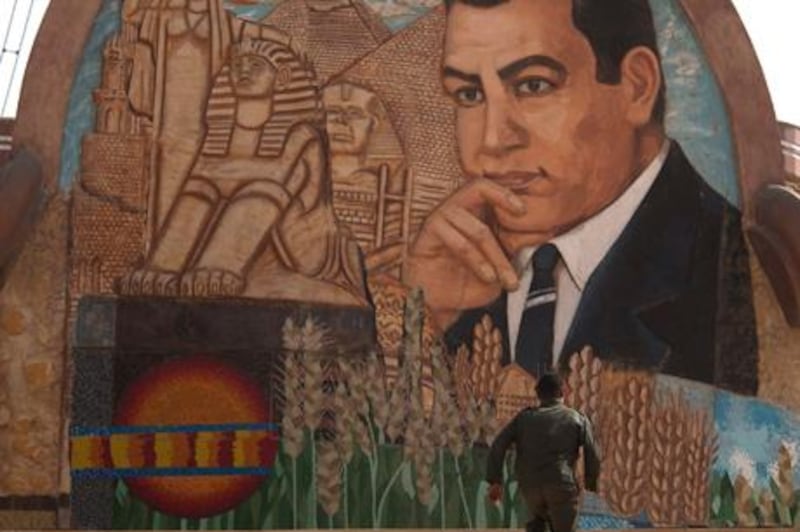LONDON // An international treasure hunt is under way for the billions of dollars that Hosni Mubarak supposedly stashed away during his almost 30 years in power as president of Egypt.
But no one has any clear idea yet of how much there is, and still less of an idea about where it might be.
Early in February, as unrest in Egypt grew, Amaney Jamal, a political science professor at Princeton University, estimated Mr Mubarak's wealth at up to US$70 billion (Dh257bn), a figure snapped up by news organisations worldwide and even by protesters, who quoted it on their placards in Tahrir Square.
Unnamed US officials have subsequently been quoted by the American media as calculating his personal fortune at much more modest, though still handsome, $2bn to $3bn.
Mr Mubarak's family cash assets in European banks, mainly in Zurich and London, are believed to stand at about $1.5bn, a UK government source said yesterday.
"The family is also rumoured to have extensive property holdings, both in Egypt and elsewhere in the world," he added. "But, if our experience is anything to go by, it is going to be a devil of a job to track it down."
Only one property outside Egypt has definitely, or almost definitely, been identified as belonging to the Mubarak family: a five-storey house in the fashionable Belgravia district of central London, which was bought by the ex-president's younger son, Gamal.
Even here, though, the registered owner is actually a Panama company, while the property's agent is a London lawyer who says he receives his instructions from Oman.
There have been suggestions that Mr Mubarak and his two sons have a multi-million, maybe, multi-billion-dollar, property empire embracing Egypt, Dubai, Los Angeles, Washington, New York, Paris, London and elsewhere.
No one, however, has yet come up with any proof, although the UK's Serious Fraud Office is quietly probing to see which of the assets it can trace.
Mr Mubarak also allegedly has gold bullion and cash secreted away in various European centres and there have even been unsubstantiated reports this week that he has embarked on shifting some of it to the UAE.
Switzerland froze all Mubarak family assets shortly after he was ousted last Friday. The US, Britain, France and Germany appeared ready to do the same but, to the surprise of many, Monday's request to the EU and Washington from the new Egyptian military regime for the freezing of assets did not mention the former president or his family, only his former aides and associates.
Maud Perdriel-Vaissière, legal adviser at Sherpa, a Paris-based group that pursues assets allegedly stolen by dictators, told the Financial Times that she "strongly regretted" that the Egyptian request for international help did not cover Mr Mubarak.
"Recent claims about the size of his wealth have caused much concern, and the only way to prevent this money from being shifted abroad to non-cooperative jurisdictions is to get it frozen as soon as possible," she said.
"This is a crucial development issue for a country where nearly 40 per cent of the country's 80 million people live on $2 or less a day."
There has been speculation that new military rulers did not want to target someone they still regard as one of their own, despite the fact that many Egyptians believe that Mr Mubarak, his half-British wife Suzanne, and their sons accumulated vast sums in kick-backs from military deals, government privatisations and foreign investments in Egypt.
Last November, Sherpa successfully got judicial investigations launched over three African presidents and their relatives: Denis Sassou-Nguesso of the Republic of the Congo; Teodoro Obiang of Equatorial Guinea; and Omar Bongo of Gabon. The investigations centre on their acquisition of property and luxury goods in France that are worth far more than their official earnings.
Nigeria and Haiti have successfully repatriated public funds in the past and Switzerland last month froze the $620 million in assets of Tunisia's former president Zine Al Abidine Ben Ali.
According to the Muslim Brotherhood in Egypt, the ex-president has private wealth amounting to $40bn, his son, Gamal, has $17bn, and the eldest son, Ala'a, has $8bn, including property on the ritzy Rodeo Drive, Los Angeles.
The party also claims that Mrs Murbarak joined the billionaires' club in her own right in 2000, with much of her fortune in property in London, Frankfurt, Madrid, Paris and Dubai.
"Channelling all the money taken illegally from the Egyptian people would set the nation on the path to prosperity, removing it from the corruption and poverty in which it has lived under the Mubarak family era," the party's website says.
None of which, though, actually gets nearer to answering the question of where it is and how much it is.
Vince Cable, the UK business secretary, believes that will only be achieved through concerted international action. The network of companies, offshore havens and banks involved is so complex that there is "no point in one government acting in isolation".
Besides, recovering any ill-gotten gains from Mubarak's years in power depends on the Egyptians themselves being ready to prosecute and convict their former president.
And, so far at least, there are few signs of that becoming a reality.





